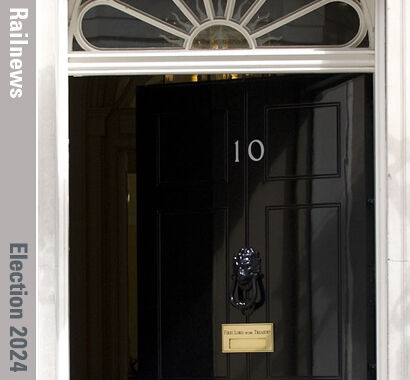It is 09.00 on Friday 5 July 2024.
The decision has been taken by the people, and two large removal vans arrived in Downing Street an hour ago.
Rishi Sunak is expected to travel to the country house of Chequers in Buckinghamshire, which is customarily put at the temporary disposal of an outgoing Prime Minister.
Sir Keir Rodney Starmer is preparing to get into a car which will take him to Buckingham Palace within the hour, where the King, also according to custom, will ask him to form a government.
From that moment, the Labour leader will become Prime Minister and First Lord of the Treasury.
Meanwhile, newly-arrived officials in the Department for Transport, some of whom are a little bleary-eyed after sitting up late to watch the election results, are carrying out the instructions to be followed in the event of a Labour win.
Messages go out from the DfT to Network Rail, the Office of Rail and Road, the Rail Delivery Group and the Great British Railways Transition Team.
Each organisation is told that morning that they must start preparing for substantial changes to the railway industry. The DfT, Operator of Last Resort and Network Rail are being instructed to work closely together from now on by forming a partnership which is to be led by a new team at the temporary headquarters of the shadow Great British Railways, alongside Derby station. They must have a functioning organisation within six months – in other words, by January 2025.
Meanwhile, Parliamentary draughtsmen have been working on a new Railways Bill, which will be presented to the Commons in the first session of the new Parliament.
The draft Railway Reform Bill drawn up by the previous government is now dead in the water: no public Bills, whether draft or substantive, survive a change of government, even though the Transport Select Committee had been conscientiously taking evidence about it from key railway industry figures in May. Whatever they said, as well as the text of the Bill itself, will now be placed in the box labelled ‘It Might Have Been’.
Labour’s new Bill will be different. Great British Railways will not be the ‘franchising authority’, because there will be no franchises to be awarded. It will not be a ‘guiding mind’, as recommended by Keith Williams in his Rail Review, but a ‘directing’ one.
Shares in several transport groups have been falling since the the Stock Exchange opened at 07.00 this morning, as it is now beyond doubt that the present National Rail passenger contracts in England will be terminated at the first available ‘break point’, and earlier than that if an operator ‘fails to deliver’.
In Scotland and Wales there are none to surrender: the devolved governments had already taken control of their railways while the Conservatives were still in office.
There will be no chance of continuing, because the train operators still in the private sector on election day are destined to be ‘folded in’ to Great British Railways. The process is intended to be inexpensive and relatively painless. Behind closed doors, even before Sir Keir has reached the palace, some transport group executives are discussing at hastily-called meetings whether it would be better to surrender the doomed contracts sooner rather than later, and be done with it.
Passenger open access offers one way for the private sector to stay on the rails, at least to some extent, and several transport groups have been industriously applying for new routes and paths over the past few months. Labour has said open access ‘will remain where it adds value and capacity to the rail network’.
But the Office of Rail and Road has yet to pronounce its verdicts on any of the recent applications, and before that happens it will have received ‘an updated framework and guidance’ about open access from the new transport secretary. No one knows what form that ‘guidance’ will take.


